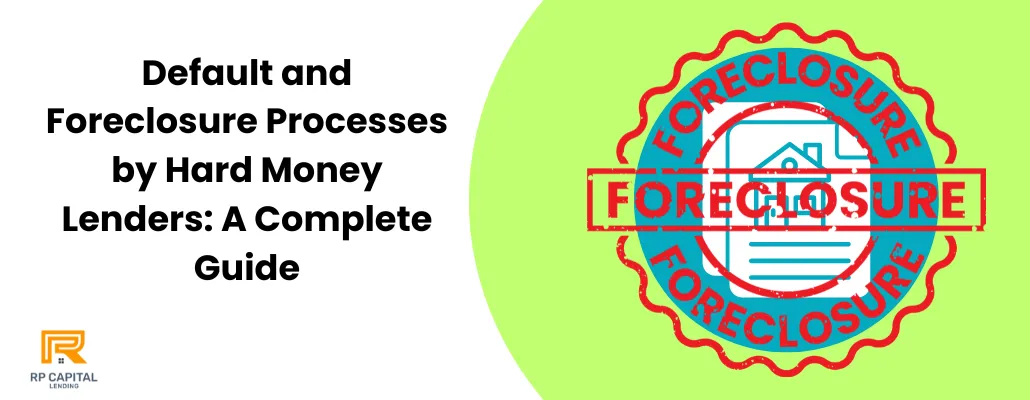Blog

Default and Foreclosure Processes by Hard Money Lenders: A Complete Guide
When borrowing from a hard money lender, the stakes are often high. If the borrower defaults, lenders must navigate the complex processes of default and foreclosure to recover their investments. But what does this process entail, and how can borrowers protect themselves?
In this guide, we’ll break down the key procedures, providing insight into how hard money lenders handle defaults, foreclosures, and collateral disposition.
Default and Foreclosure: What You Need to Know?
Hard money loans are generally secured by real estate or other valuable collateral. When a borrower defaults, the lender will initiate specific procedures to recover the loan. Here’s a breakdown of the typical process followed by hard money lenders:

1. Identifying Borrower Default
A borrower defaults when they fail to meet their obligations as outlined in the loan agreement. This may include:
Missing payments
Violating terms of the loan (such as unauthorized property changes)
Failure to repay the loan at the end of the term
Once default is identified, the lender will often send a notice to the borrower, providing a grace period to rectify the situation.
Additional Point:
It’s essential for borrowers to understand that different lenders may have different grace periods and terms for curing defaults. Always review your contract to know your lender’s specific requirements and timelines.
2. Foreclosure Proceedings
If the default isn’t cured within the given timeframe, the lender can initiate foreclosure. Foreclosure is the legal process where the lender seeks to claim ownership of the property (or other collateral) to recover their investment. Here’s how the foreclosure process typically works:
Step 1: Pre-foreclosure Notice:
The lender sends a final notice to the borrower, providing them with one last chance to pay the outstanding amount.Step 2: Legal Filing:
The lender files a lawsuit or a notice of default, depending on state laws, to officially start the foreclosure process.Step 3: Auction or Sale:
If the borrower does not rectify the situation or settle the debt, the property is auctioned off or sold by the lender to recover their investment.
Additional Point:
Borrowers may also face legal fees, late payment penalties, and other costs during the foreclosure process, which can add up quickly. Understanding these potential costs is critical to managing the risk of default.
3. Disposition of Collateral
The final step in the process is the sale or liquidation of the collateral. This is done to recover the loaned amount. Lenders may:
Sell the collateral directly to buyers
Auction the property to the highest bidder
Use the collateral to satisfy the outstanding loan balance
If the sale of the property doesn’t cover the entire loan, the lender may seek a deficiency judgment to recover the difference from the borrower.
Additional Point:
In some cases, lenders may offer the borrower a deed in lieu of foreclosure, where the borrower voluntarily transfers ownership of the property to the lender to avoid a lengthy foreclosure process. This option can be less damaging to a borrower’s credit score.
How Foreclosure Affects Borrowers’ Credit Scores
Foreclosure can have a lasting impact on a borrower’s credit. A foreclosure can remain on your credit report for up to seven years, affecting your ability to secure future financing. The earlier a borrower takes action to address potential default, the better their chances of avoiding severe credit consequences.
Additional Point:
Foreclosures not only affect credit scores but also impact future borrowing ability. Hard money lenders may be less likely to work with borrowers who have a history of foreclosure or default.
Tips to Avoid Default and Foreclosure
Borrowers can avoid defaulting by:
Ensuring timely payments
Communicating openly with the lender about financial difficulties
Carefully reviewing loan terms before signing
Maintaining an emergency fund to cover unexpected expenses
Monitoring market conditions if your loan is based on the after-repair value (ARV) of real estate
Frequently Asked Questions (FAQs)
1. What happens if I default on a hard money loan?
If you default, the lender will likely begin the foreclosure process, which could result in the loss of your property or other collateral.
2. Can I avoid foreclosure after defaulting on a hard money loan?
Yes, if you communicate with your lender quickly and either pay the outstanding amount or negotiate new terms, you may avoid foreclosure.
3. How long does the foreclosure process take?
The foreclosure process can take several months, depending on state laws and how quickly the lender moves through the legal steps.
4. What is a deficiency judgment in foreclosure?
A deficiency judgment is a court order requiring the borrower to pay the difference if the sale of the collateral doesn’t fully cover the loan.
5. Can I negotiate with the lender during the foreclosure process?
Yes, borrowers can often negotiate with the lender during foreclosure to reach a settlement or payment arrangement, potentially avoiding the loss of the property.
Conclusion
Understanding the default and foreclosure process is critical for both hard money borrowers and lenders. While these processes can seem daunting, being proactive and informed can help borrowers protect their assets and work with lenders to resolve defaults.
If you’re considering a hard money loan, ensure you fully understand the terms and communicate with your lender if financial difficulties arise.
Disclaimer: Loans only apply to non-owner occupied properties. Rates, terms and conditions offered only to qualified borrowers, may vary upon loan product, deal structure, other applicable considerations, and are subject to change at any time without notice.
Copyright © 2025. All Rights Reserved.


